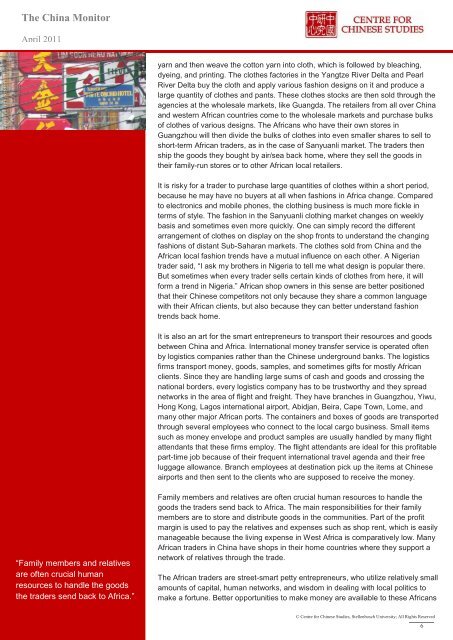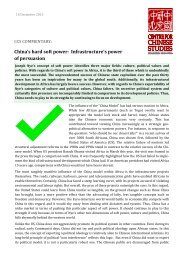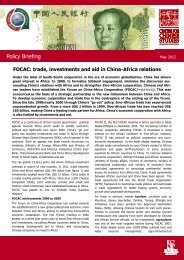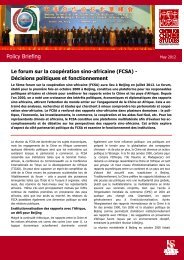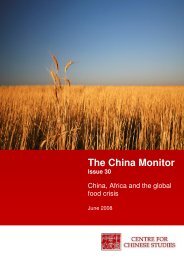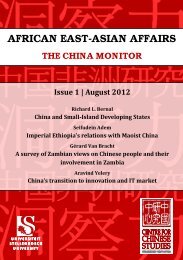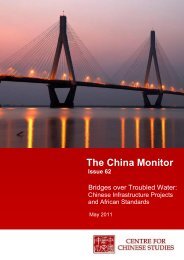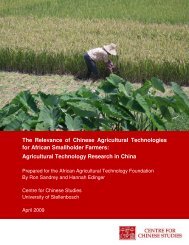The China Monitor - The Centre for Chinese Studies
The China Monitor - The Centre for Chinese Studies
The China Monitor - The Centre for Chinese Studies
You also want an ePaper? Increase the reach of your titles
YUMPU automatically turns print PDFs into web optimized ePapers that Google loves.
<strong>The</strong> <strong>China</strong> <strong>Monitor</strong><br />
April 2011<br />
```<br />
yarn and then weave the cotton yarn into cloth, which is followed by bleaching,<br />
dyeing, and printing. <strong>The</strong> clothes factories in the Yangtze River Delta and Pearl<br />
River Delta buy the cloth and apply various fashion designs on it and produce a<br />
large quantity of clothes and pants. <strong>The</strong>se clothes stocks are then sold through the<br />
agencies at the wholesale markets, like Guangda. <strong>The</strong> retailers from all over <strong>China</strong><br />
and western African countries come to the wholesale markets and purchase bulks<br />
of clothes of various designs. <strong>The</strong> Africans who have their own stores in<br />
Guangzhou will then divide the bulks of clothes into even smaller shares to sell to<br />
short-term African traders, as in the case of Sanyuanli market. <strong>The</strong> traders then<br />
ship the goods they bought by air/sea back home, where they sell the goods in<br />
their family-run stores or to other African local retailers.<br />
It is risky <strong>for</strong> a trader to purchase large quantities of clothes within a short period,<br />
because he may have no buyers at all when fashions in Africa change. Compared<br />
to electronics and mobile phones, the clothing business is much more fickle in<br />
terms of style. <strong>The</strong> fashion in the Sanyuanli clothing market changes on weekly<br />
basis and sometimes even more quickly. One can simply record the different<br />
arrangement of clothes on display on the shop fronts to understand the changing<br />
fashions of distant Sub-Saharan markets. <strong>The</strong> clothes sold from <strong>China</strong> and the<br />
African local fashion trends have a mutual influence on each other. A Nigerian<br />
trader said, “I ask my brothers in Nigeria to tell me what design is popular there.<br />
But sometimes when every trader sells certain kinds of clothes from here, it will<br />
<strong>for</strong>m a trend in Nigeria.” African shop owners in this sense are better positioned<br />
that their <strong>Chinese</strong> competitors not only because they share a common language<br />
with their African clients, but also because they can better understand fashion<br />
trends back home.<br />
It is also an art <strong>for</strong> the smart entrepreneurs to transport their resources and goods<br />
between <strong>China</strong> and Africa. International money transfer service is operated often<br />
by logistics companies rather than the <strong>Chinese</strong> underground banks. <strong>The</strong> logistics<br />
firms transport money, goods, samples, and sometimes gifts <strong>for</strong> mostly African<br />
clients. Since they are handling large sums of cash and goods and crossing the<br />
national borders, every logistics company has to be trustworthy and they spread<br />
networks in the area of flight and freight. <strong>The</strong>y have branches in Guangzhou, Yiwu,<br />
Hong Kong, Lagos international airport, Abidjan, Beira, Cape Town, Lome, and<br />
many other major African ports. <strong>The</strong> containers and boxes of goods are transported<br />
through several employees who connect to the local cargo business. Small items<br />
such as money envelope and product samples are usually handled by many flight<br />
attendants that these firms employ. <strong>The</strong> flight attendants are ideal <strong>for</strong> this profitable<br />
part-time job because of their frequent international travel agenda and their free<br />
luggage allowance. Branch employees at destination pick up the items at <strong>Chinese</strong><br />
airports and then sent to the clients who are supposed to receive the money.<br />
“Family members and relatives<br />
are often crucial human<br />
resources to handle the goods<br />
the traders send back to Africa.”<br />
Family members and relatives are often crucial human resources to handle the<br />
goods the traders send back to Africa. <strong>The</strong> main responsibilities <strong>for</strong> their family<br />
members are to store and distribute goods in the communities. Part of the profit<br />
margin is used to pay the relatives and expenses such as shop rent, which is easily<br />
manageable because the living expense in West Africa is comparatively low. Many<br />
African traders in <strong>China</strong> have shops in their home countries where they support a<br />
network of relatives through the trade.<br />
<strong>The</strong> African traders are street-smart petty entrepreneurs, who utilize relatively small<br />
amounts of capital, human networks, and wisdom in dealing with local politics to<br />
make a <strong>for</strong>tune. Better opportunities to make money are available to these Africans<br />
© <strong>Centre</strong> <strong>for</strong> <strong>Chinese</strong> <strong>Studies</strong>, Stellenbosch University; All Rights Reserved<br />
6


